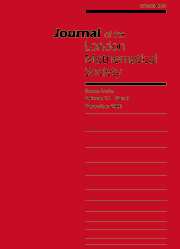Article contents
DIFFERENTIABILITY PROPERTIES OF AN ABSTRACT AUTONOMOUS COMPOSITION OPERATOR
Published online by Cambridge University Press: 01 June 2000
Abstract
The autonomous composition operator is the nonlinear map which takes a pair of functions into its composite function. The composition operator often appears in problems of nonlinear analysis and to analyse such problems it is often important to know whether the composition operator is continuous or differentiable. A fairly large number of papers in the literature have been devoted to the study of composition operators. For fullscale references, we refer the reader to the extensive monographs of Appell and Zabrejko [1] and Runst and Sickel [8]. To exemplify a typical situation, we consider the semilinear Dirichlet boundary value problem
formula here
where Ω denotes a sufficiently regular bounded open subset of ℝN, and h0 a map of ℝ to ℝ, and where u is the unknown of the problem. We assume that we know that a certain function u0 belonging to a certain function space [Xscr ] solves (1.1). Then if we wish to know whether by perturbing h0 in a certain function space, say [Yscr ], the solutions u depend on h continuously, with differentiability, with analyticity or bifurcate, we could set G[h, u] ≡ Δu+h ∘ u, recast problem (1.1) into the abstract form
formula here
and study the solution set of equation (1.2) around the pair (h0, u0) by means of the implicit function theorem or by local bifurcation theorems in a Banach space setting.
- Type
- Research Article
- Information
- Copyright
- The London Mathematical Society 2000
- 7
- Cited by


